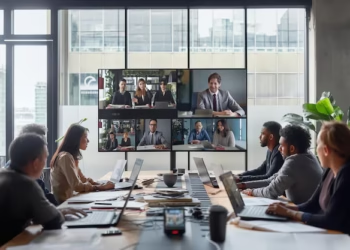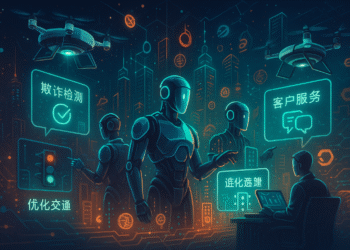Introduction
Artificial Intelligence (AI) is no longer a futuristic concept confined to science fiction. It is a transformative force that is reshaping industries, economies, and societies. Among the many sectors AI is revolutionizing, global trade and international policy stand out as areas where its impact is both profound and rapidly evolving. The recent AI Action Summit in Paris brought together world leaders, including European Commission President Ursula von der Leyen, French President Emmanuel Macron, and U.S. Vice-President JD Vance, to discuss the implications of AI-driven trade policies. One of the key topics of discussion was the impact of AI on economic decisions, particularly in light of the newly imposed U.S. tariffs on aluminum and steel imports.
While AI has already proven its worth in fields such as healthcare, finance, and automation, its role in trade negotiations and policymaking is still in its infancy. However, the Paris summit demonstrated how AI-driven models are now being used to simulate economic outcomes, predict trade imbalances, and optimize policy decisions. This article delves deeper into how AI is influencing global trade, the potential benefits and risks, and whether AI can make better economic decisions than human policymakers.
AI-Powered Economic Predictions and Policy-Making
Historically, trade policies have been based on economic models, human expertise, and geopolitical strategies. These traditional methods, while effective, are often slow, prone to bias, and limited by the complexity of global trade dynamics. Enter AI, which is now being incorporated into the policymaking process to:
- Analyze Trade Flows and Predict the Effects of Tariffs and Sanctions: AI can process vast amounts of trade data to predict how tariffs and sanctions will affect different economies. For example, AI models can simulate the impact of U.S. tariffs on European markets, providing policymakers with a clearer picture of potential outcomes.
- Model Economic Scenarios in Real-Time: One of the most significant advantages of AI is its ability to model economic scenarios in real-time. This allows policymakers to see the potential outcomes of their decisions before implementing them. At the Paris summit, leaders reportedly used AI-driven simulations to assess the short- and long-term impact of U.S. tariffs on European markets. These simulations provided alternative policy options, some of which aligned with existing human strategies, while others suggested unconventional but potentially beneficial approaches.
- Optimize Trade Agreements: AI can evaluate billions of data points, including global supply chains, demand forecasts, and national economies, to optimize trade agreements. This capability is particularly valuable in complex negotiations involving multiple countries with competing interests.
- Identify Loopholes and Inefficiencies: AI can detect inefficiencies and loopholes in current trade policies, making global trade more streamlined and effective. For instance, AI can identify areas where tariffs are unnecessarily high or where trade barriers are causing inefficiencies in supply chains.
Can AI Improve Trade Decisions?
One of the biggest advantages of AI in policymaking is its ability to process vast amounts of economic data without bias or political motivations. Unlike humans, AI:
- Removes Emotional or Political Bias from Decision-Making: Human policymakers are often influenced by political considerations, personal biases, and emotional responses. AI, on the other hand, makes decisions based solely on data, removing these biases from the equation.
- Processes Real-Time Economic Shifts: AI can process real-time economic data, allowing for quicker responses to global trade changes. This is particularly important in a rapidly changing global economy where delays in decision-making can have significant consequences.
- Detects Inefficiencies in Supply Chains and Trade Agreements: AI can identify inefficiencies in supply chains and trade agreements that humans might overlook. For example, AI has already been used to optimize supply chain networks in multinational corporations, and now governments are considering applying the same methodologies to entire national economies.
- Enhances Trade Negotiation Strategies: AI can identify optimal trade deals for multiple nations simultaneously, enhancing trade negotiation strategies. This capability is particularly valuable in complex negotiations involving multiple countries with competing interests.
Risks and Challenges of AI in Trade Policies
Despite its advantages, AI in trade policymaking is not without risks:
- Data Bias and Manipulation: AI is only as good as the data it is trained on. If trade data is incomplete, biased, or manipulated by external entities, AI decisions could be flawed. For example, if an AI model is trained on data that reflects historical trade imbalances, it may perpetuate those imbalances rather than correct them.
- Loss of Human Oversight: While AI can suggest optimal trade policies, human oversight is still crucial to ensure ethical and strategic considerations are taken into account. AI models may not fully understand the geopolitical context or the long-term implications of certain trade policies.
- Cybersecurity Threats: AI-driven economic models can become targets for cyberattacks, with adversaries seeking to manipulate AI recommendations to gain an economic advantage. For example, a cyberattack on an AI model used in trade negotiations could result in biased or manipulated recommendations that favor one country over another.
- Unforeseen Economic Disruptions: AI models cannot always predict political or social upheavals that may impact global trade, such as pandemics, war, or economic recessions. These events can have a significant impact on trade dynamics, and AI models may not be able to account for them.
The Future of AI in Global Trade
AI’s role in global trade is expected to expand significantly in the next decade. Some potential developments include:
- Automated Trade Negotiations: AI-powered chatbots and negotiation models could soon participate in international trade discussions. These AI systems could analyze data in real-time, suggest optimal negotiation strategies, and even draft trade agreements.
- Real-Time Trade Monitoring: AI could provide instant analysis of supply chain disruptions and propose immediate solutions. For example, if a natural disaster disrupts a key supply chain, AI could quickly identify alternative suppliers and routes to minimize the impact on global trade.
- AI-Driven Economic Policies: Future AI systems may craft entire trade policies based on economic stability, growth potential, and market trends. These policies could be tailored to the specific needs of individual countries, taking into account their unique economic circumstances.
- AI in Customs & Tariff Regulations: AI could help streamline import/export procedures, reducing trade friction and bureaucratic delays. For example, AI could automate the process of classifying goods for customs purposes, reducing the time and cost associated with importing and exporting goods.
Final Thoughts
AI is increasingly becoming a key player in shaping global trade policies. The Paris summit showcased how AI-driven decision-making is no longer a distant future but an emerging reality. While AI has the potential to enhance efficiency, reduce biases, and optimize trade agreements, it still requires careful oversight, regulation, and transparency.
The question remains: Will AI-driven economic models become the primary tool for trade negotiations, or will human policymakers continue to have the final say? The answer likely lies in a balanced approach that leverages the strengths of both AI and human expertise. AI can provide valuable insights and recommendations, but human policymakers must ensure that these recommendations align with ethical, strategic, and geopolitical considerations.
As AI continues to evolve, its role in global trade and policy will undoubtedly grow. The challenge for policymakers will be to harness the power of AI while mitigating its risks. The future of global trade may well depend on how successfully we navigate this complex and rapidly changing landscape.
💬 What do you think? Should AI play a larger role in trade policymaking, or should human expertise always take precedence? Let’s discuss! 👇
🔗 Stay ahead with the latest AI insights! Subscribe for in-depth updates and exclusive content.
#AIinTrade #AIPolicy #ArtificialIntelligence #TechNews #GlobalEconomy #TradeNegotiations















